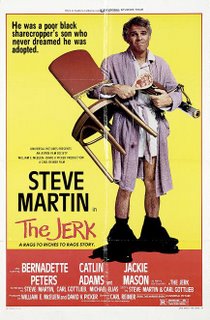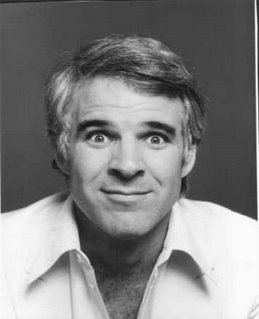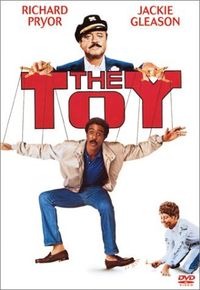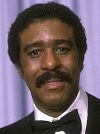
"I think next week I'll be able to send some more money as I may have extra work. My friend Patty promised me a blow job." --Navin Johnson in a letter home to his family.
I know what you're thinking: "This isn't an eighties film--it was made in 79!" Please, calm down, take a seat, we can make this work.
 Although The Jerk isn't technically a film of the 80's, it does contain subject matter similar to the other eighties films we've studied. Navin Johnson, played by a hilarious and naive Steve Martin, realys his rags-to-riches then back-to-rags but then lifted-up-again-into-riches story. A pasty white man born into a black family, Martin has to venture out of his rural Mississippi household and discover his place among white Americans.
Although The Jerk isn't technically a film of the 80's, it does contain subject matter similar to the other eighties films we've studied. Navin Johnson, played by a hilarious and naive Steve Martin, realys his rags-to-riches then back-to-rags but then lifted-up-again-into-riches story. A pasty white man born into a black family, Martin has to venture out of his rural Mississippi household and discover his place among white Americans.Navin drifts around from job to job, living a simple and happy life and wooing the girl of his dreams. But, once someone takes off with his invention, the "Optigrab," a handle for eye-glasses, and sends him millions of dollars as ten million people buy the product, Navin becomes the exact opposite kind of person he was in Mississippi. He begins to love material things, and the relationship between he and his love Marie falls apart.

Navin hits rock bottom when the product makes people go cross-eyed and he is sued for all of his money. Leaving his wife, he says, "All I need is this ashtray, this paddle game, this remote control, these matches, this lamp, this magazine, and this chair!" as he walks out the door. He has been drivend to ruin by his materialism. But soon, his rural black family comes to his rescue as the father smartly invested the checks Navin sent in a conservative money market account--proving again that the most valuable things in life are not possessions, but things like security, family, love, and contentment.
There is really no reason for you to read the script of The Jerk, but here it is anyway
Steve Martin Homepage


